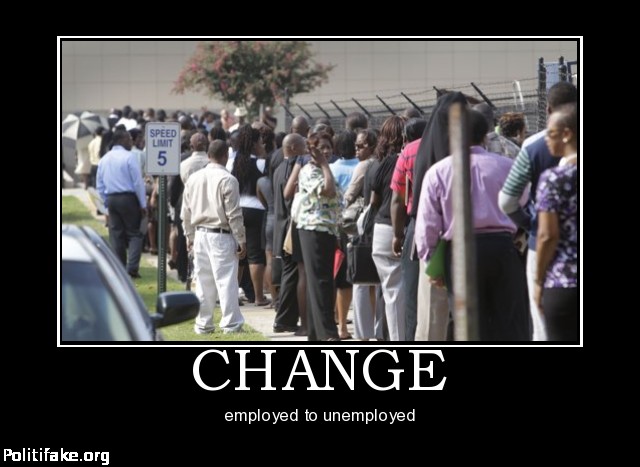 First thing this morning I opened my e-mail to receive a forward from our illustrious senior editor about today’s job report. Dismal it is. But in forwarding the CNBC article he pointed out the confusing choice of words that might lead busy scan readers to think things were not so bad. The confusing text:
First thing this morning I opened my e-mail to receive a forward from our illustrious senior editor about today’s job report. Dismal it is. But in forwarding the CNBC article he pointed out the confusing choice of words that might lead busy scan readers to think things were not so bad. The confusing text:
The Labor Department reported Friday that nonfarm payroll growth eased amid hopes that the economy had begun to achieve the escape velocity needed for sustained growth.
The use of the term “eased” is inappropriate and confusing for most people. In fairness the full report was no whitewash of Obamanomics. When job unemployment rates are referenced in similar reports the pro-Obama media often leads or emphasizes with a comment to the effect “unemployment rate goes down.” That was the case periodically leading up to the 2012 election. Of course the numbers are ratios and they refer to a percentage of job seekers compared to those employed, and the job seekers have declined. As CNBC points out in later paragraphs in the same article:
Moreover, the drop in the jobless rate was little more than a statistical anomaly, with the labor-force participation rate tumbling to a 34-year low of 63.3 percent. However, a broader measure of unemployment that counts the discouraged and underemployed also fell, declining to 13.8 percent from February’s 14.3 percent.
The actual level of employment dropped by 206,000 and the number of Americans considered still in the labor force tumbled by 496,000.
“Having such a disappointing figure in March will have a volcanic negative impact on sentiment in critical economic areas, such as housing,” said Todd Schoenberger, managing partner at LandColt Capital. “Wall Street will not be happy, and are certain to punish stocks today.”
As Gary Bauer points out in today’s End of Day Report
Administration apologists argue that the large number of people leaving the workforce is the result of retiring baby boomers. That is true to a point. But there are countless baby boomers who are not retiring because they can’t afford to do so. They have not yet dug out from the financial morass of the last five years and must continue working whether they want to or not.
And of course the apologists also can not use the baby boomer retirement excuse to explain the devastating high unemployment among certain demographic groups and low job creation in certain economic sectors. Bauer continues:
Don’t Blame Sequester Cuts
The spinners in the White House and the media are suggesting that the slowdown in growth is due to the sequestration cuts, which began in March. That is absurd. The budget cuts that have gone into effect to date are minuscule compared to our massive economy. Moreover, the retail sector lost 24,000 jobs last month while the government lost only 7,000 jobs.
But there are other “big movers” in the economy that took effect months ago, namely the Obama tax hikes that went into effect on January 1st. The Social Security payroll tax affected everybody. In addition, there are higher rates on capital gains and higher marginal tax rates. Conservatives have argued for years that such tax increases result in lower economic growth.
And then there is the 800-pound gorilla everyone is trying to ignore — Obamacare. Every day its effects multiply, as we have often reported here. Small businesses are not hiring. It is reducing hours, forcing many full-time workers to become part-time workers. It is delaying investment.
This should not be new news to anyone. Conservatives warned three years ago this would be the result. Even some in the media have been forced to concede the obvious. Just before the year began, USA Today ran a story headlined, “Health Care Law May Mean Less Hiring In 2013.” And Obamacare will continue to become a heavier and heavier burden on the economy as more and more of its mandates, regulations and taxes kick in. It must be repealed!
Economics is the dismal science when Obama gets hold of it. R Mall
